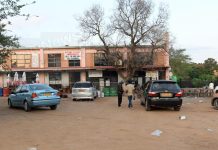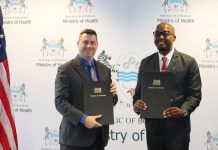Africa-Press – Botswana. Minister of Environment and Tourism, Ms Philda Kereng says it is imperative to approach and address the growing dynamic wildlife management issues with a different mindset to achieve sustainable development as espoused in Vision 2036 as well as the Reset Agenda.
Officiating at the 37th Botswana Wildlife Training Institute graduation ceremony themed: Innovative Workplace to Combat Modern Wildlife Challenges, on Friday, Ms Kereng said the country was endowed with a wide diversity of natural resources in the form of flora and large population of wildlife species, noting that coexisting with the natural capital had its own challenges such as human-wildlife conflict.
“The situation is exacerbated by climate change, illegal wildlife trade, habitat destruction, habitat fragmentation and large-scale landscape modification caused by human activities,” she said.
As such, the minister challenged graduates to embrace the ideals of the national guiding principles to influence change in the workplace as they become fully operational.
“Seek for new solutions that leverage the power of the ever evolving information and communication technology to enhance service delivery,” she said.
Ms Kereng said the theme resonated well with the wildlife management realities in the country, particularly as it transited from middle-income to high income status.
“Our Vision 2036 aspires to have developed an internationally competitive workforce that is proactive, creative and has international exposure. Also our vision aspires achieving prosperity for all, thus requires us to pursue a sustainable development pathway that balances social, economic and environmental objectives,” she added. To achieve the balance, Ms Kereng noted that the ministry continued to make efforts to mitigate human-wildlife conflict to ensure sustainable agriculture and food security as well as the sustainability of wildlife based tourism sector.
The ministry, she said, had taken up the challenge posed by such conflicts with the gravity it deserved.
“The challenge entails the urgency to involve stakeholders in drawing up innovative policies and strategic interventions for human-wildlife conflict mitigation at national, district and village levels,” she said.
She cited the recent human-wildlife conflict mini pitso held at Kasane as a step in the right direction towards mitigating the current challenges, adding the ministry would be rolling out the district level mini pitsos over the next months with a national event to be held later this year.
Ms Kereng reiterated the need to continue instilling a sense of wildlife ownership among communities through Community Based Natural Resource Management projects and other innovative interventions to reduce human-wildlife conflicts.
As such, graduates were advised to familiarise themselves with polices so that they could easily guide the communities and support them to come up with other innovative strategies.
In his welcome remarks, Kgosi Tawana Moremi of Batawana said the institution had been an important landmark in Ngamiland region since its establishment in the late 1970s to provide basic training skills and specialised knowledge for wildlife management.
“Many wildlife officers have gone through the institution. I have no doubt that its products have significantly contributed to wildlife management in the country over the years and we have seen growth of the institute over the years to provide other environmental management skills that facilitate Batswana to venture into employment and business opportunities in tourism,” Kgosi Tawana said.
He also called for interventions to reduce the impact of human-wildlife conflict issues in the region so that communities could have productive livelihoods while at the same time protecting wildlife.
For More News And Analysis About Botswana Follow Africa-Press






